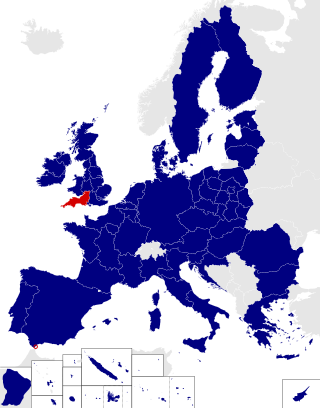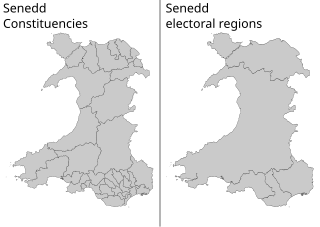
The 1999 European Parliament election was the United Kingdom's part of the European Parliament election 1999. It was held on 10 June 1999. Following the European Parliamentary Elections Act 1999, it was the first European election to be held in the United Kingdom where the whole country used a system of proportional representation. In total, 87 Members of the European Parliament were elected from the United Kingdom across twelve new regional constituencies.

The 2004 European Parliament election was the United Kingdom's part of the wider 2004 European Parliament election which was held between 10 and 13 June 2004 in the 25 member states of the European Union. The United Kingdom's part of this election was held on Thursday 10 June 2004. The election also coincided with the 2004 local elections and the London Assembly and mayoral elections. In total, 78 Members of the European Parliament were elected from the United Kingdom using proportional representation.

In the United Kingdom (UK), each of the electoral areas or divisions called constituencies elects one member to the House of Commons.

South West was a combined constituency region of the European Parliament, comprising the South West of England and Gibraltar. Seven, later six, Members of the European Parliament using closed party-list proportional representation allocated using the D'Hondt method of distribution were elected. The constituency was abolished when Britain left the European Union on 31 January 2020.

West Midlands was a constituency of the European Parliament. It was represented by seven MEPs using the D'Hondt method of party-list proportional representation. In 2009, the constituency was reduced to six seats, but also elected a "virtual MEP" who took her seat in the Parliament when the Treaty of Lisbon came into effect. The constituency was represented by seven MEPs prior to the 2009 election, until the UK exit from the European Union on 31 January 2020.

The Parliament of the United Kingdom currently has 650 parliamentary constituencies across the constituent countries, each electing a single member of parliament (MP) to the House of Commons by the plurality voting system, ordinarily every five years. Voting last took place in all 650 of those constituencies at the United Kingdom general election on 12 December 2019.

South is a European Parliament constituency in Ireland. It elects 5 Members of the European Parliament (MEPs) using proportional representation by means of the single transferable vote (PR-STV).

The Senedd constituencies and electoral regions are the electoral districts used to elect members of the Senedd to the Senedd, and have been used in some form since the first election of the then National Assembly for Wales in 1999. New boundaries were introduced for the 2007 elections and currently consist of forty constituencies and five regions. The five electoral regions are: Mid and West Wales, North Wales, South Wales Central, South Wales East, and South Wales West, with the forty constituencies listed below. Voting last took place in all districts in the 2021 Senedd election, and is not used for local government.
There are four types of elections in Wales: elections to the House of Commons of the United Kingdom, elections to the devolved Senedd, local elections to community councils and the 22 principal areas, and the Police and Crime Commissioner elections. In addition there are by-elections for each aforementioned election. Elections are held on Election Day, which is conventionally a Thursday. Since the passing of the Fixed-term Parliaments Act 2011 for UK general elections, all four types of elections are held after fixed periods, though early elections to the UK parliament can occur in certain situations, with Senedd elections being postponed to avoid elections to the UK parliament and Senedd coinciding with each other.

The 2009 European Parliament election was the United Kingdom's component of the 2009 European Parliament election, the voting for which was held on Thursday 4 June 2009. The election was held concurrently with the 2009 local elections in England. In total, 72 Members of the European Parliament were elected from the United Kingdom using proportional representation.

Midlands West was a constituency of the European Parliament in the United Kingdom which existed from 1979 to 1999, prior to the adoption of proportional representation in England, Scotland and Wales. It elected one Member of the European Parliament by the first-past-the-post electoral system.

The regions of England, formerly known as the government office regions, are the highest tier of sub-national division in England. They were established in 1994 and follow the 1974–96 county borders. They are a continuation of the former 1940s standard regions which followed the 1889–1974 administrative county borders. Between 1994 and 2011, all nine regions had partly devolved functions; they no longer fulfil this role, continuing to be used for limited statistical purposes.

There are five types of elections in the United Kingdom: elections to the House of Commons of the United Kingdom, elections to devolved parliaments and assemblies, local elections, mayoral elections, and police and crime commissioner elections. Within each of those categories, there may also be by-elections. Elections are held on Election Day, which is conventionally a Thursday, and under the provisions of the Dissolution and Calling of Parliament Act 2022 the timing of general elections can be held at the discretion of the prime minister during any five-year period. All other types of elections are held after fixed periods, though early elections to the devolved assemblies and parliaments can occur in certain situations. The five electoral systems used are: the single member plurality system (first-past-the-post), the multi-member plurality, the single transferable vote, the additional member system, and the supplementary vote.

The Parliamentary Voting System and Constituencies Act 2011(c. 1) is an Act of the Parliament of the United Kingdom that made provision for the holding of a referendum on whether to introduce the Alternative Vote system in all future general elections to the UK Parliament and also made provision on the number and size of parliamentary constituencies. The Bill for the Act was introduced to the House of Commons on 22 July 2010 and passed third reading on 2 November by 321 votes to 264. The House of Lords passed the Bill, with amendments, on 14 February 2011, and after some compromises between the two Houses on amendments, it received Royal Assent on 16 February 2011.

In the United Kingdom, the Alternative Vote referendum also known as the UK-wide referendum on the Parliamentary voting system was a referendum that took place on 5 May 2011, on whether to change the system for electing the House of Commons, the lower house of the national Parliament at Westminster. In the result of a Yes vote, future United Kingdom general elections would have used the "Alternative Vote" (AV); in the event of a No vote, the voting system would remain the same, with the UK continuing to use the "First Past the Post" (FPTP) voting system. The votes cast in the referendum were first counted in each of 440 districts or electoral divisions across the country, which were then combined and declared at a regional level.

The 2014 European Parliament election was the United Kingdom's component of the 2014 European Parliament election, held on Thursday 22 May 2014, coinciding with the 2014 local elections in England and Northern Ireland. In total, 73 Members of the European Parliament were elected from the United Kingdom using proportional representation. England, Scotland and Wales use a closed-list party list system of PR, while Northern Ireland used the single transferable vote (STV).

Midlands–North-West is a European Parliament constituency in Ireland. It elects four Members of the European Parliament (MEPs) on the electoral system of proportional representation by means of the single transferable vote (PR-STV). At the 2024 European Parliament election, it will elect 5 MEPs.

The European Union Referendum Act 2015 was an Act of the Parliament of the United Kingdom that made legal provision for a consultative referendum to be held in the United Kingdom and Gibraltar, on whether it should remain a member state of the European Union or leave the bloc altogether. The Bill was introduced to the House of Commons by Philip Hammond, Foreign Secretary on 28 May 2015. Two weeks later, the second reading of the Bill was supported by MPs from all parties except the SNP; the Bill subsequently passed on its third reading in the Commons on 7 September 2015. It was approved by the House of Lords on 14 December 2015, and given Royal Assent on 17 December 2015. The Act came partly into force on the same day and came into full legal force on 1 February 2016.

The 2016 United Kingdom European Union membership referendum took place in the United Kingdom and Gibraltar on 23 June 2016. Membership of the European Union had been a topic of political debate in the United Kingdom since the country joined the European Communities in 1973. This referendum was conducted very differently from the European Communities membership referendum in 1975; a more localised and regionalised counting procedure was used, and the ballot was overseen by the Electoral Commission, a public body which did not exist at the time of the first vote. This article lists, by voting area for Great Britain and Gibraltar and by parliamentary constituency for Northern Ireland, all the results of the referendum, each ordered into national and regional sections.

The 2019 European Parliament election in Ireland is the Irish component of the 2019 European Parliament election and was held on Friday, 24 May 2019, on the same day as the 2019 local elections and a referendum easing restrictions on divorce. The election was conducted in three constituencies under the single transferable vote (STV). Thirteen MEPs were elected, but the last candidate elected in both Dublin and South did not take their seats until after Brexit on 31 January 2020.


















